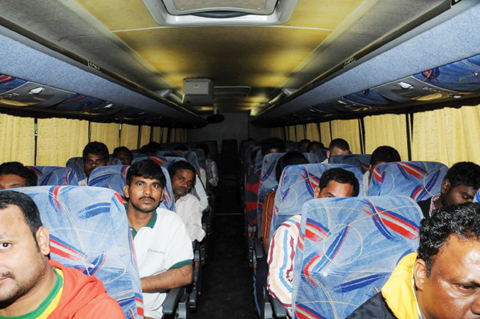 KUWAIT: This handout photo provided by the Interior Ministry shows people inside a ministry bust shortly after they were arrested during a security campaign in Hawally and Rega’ie last week.
KUWAIT: This handout photo provided by the Interior Ministry shows people inside a ministry bust shortly after they were arrested during a security campaign in Hawally and Rega’ie last week.KUWAIT: While calling on his countrymen who are illegally staying in Kuwait to turn themselves over to the authorities, the Sri Lankan ambassador to Kuwait noted that the current partial amnesty is not attractive enough to convince expatriates to take advantage of it. "When we communicate with our people, especially those who call with regards to the amnesty, they don't seem to be convinced," said Kandeepan Bala.
"A regular amnesty means that you are allowed to leave the country without paying fines and that you are free to return. In the current amnesty, you have to pay. Even without the amnesty, the government of Kuwait dispenses goodwill, and we thank them for this. However, I think this amnesty is similar to the voluntary repatriation program which has already been in place for years," Bala explained.
"But we reiterate to our people to take advantage of opportunities given by the host country because at the end of the day, if you are illegal and if the authorities catch you, they will deport you without hesitation. So in order to avoid major procedures, you better come to our embassy and get the necessary papers so we can help you out," he noted.
Bala disclosed that unlike in the past, orders or decisions by the Ministry of Interior are usually communicated to them through a circular, but for the latest "amnesty", there have been no official communications yet. "We got the information from the media, and until now no memorandum from the Ministry of Interior has been sent. So like other embassies, we went directly to them to get the details of the reports. The amnesty this time is a partial one, so there's not much attention from overstaying expats," he added.
Partial amnesty
On Jan 10, the Ministry of Interior announced a partial amnesty for all illegal residents in Kuwait. Residency violators are allowed to pay fines and either legalize their status or leave the country without being blacklisted. This will mean they can return on a new visa in the future, but unlike in previous years, residency violators will not be forgiven fines and must still clear all dues.
The ministry's Director of Public Relations and Security Media Brig Adel Al-Hashash told the press that all residency affairs departments across the country are ready to receive violators in order to rectify their legal status, pay fines and leave the country. However, those who are caught by security personnel will be deported and banned from returning even after fully paying fines. Under normal circumstances, the fine for overstaying is KD 2 per day and is capped at a maximum of KD 600.
Other embassies, like those of the Philippines and India, released guidelines for their nationals last week.
By Ben Garcia










